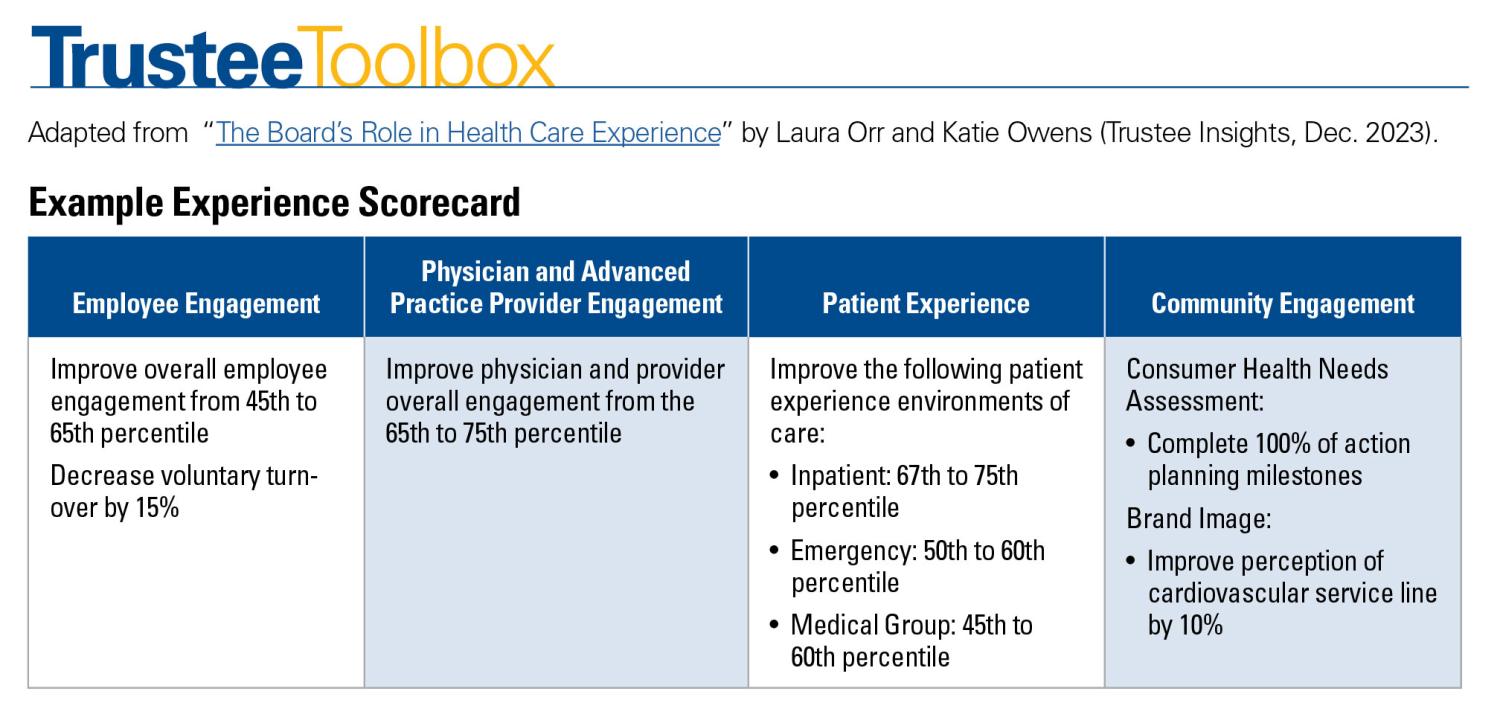
Quality
The Board’s Role in Health Care Experience
Trustees have an opportunity to elevate their organization’s outcomes and performance
By Laura Orr and Katie Owens
It is a pivotal time for our industry to assure the well-being and sustainability of health care organizations. The role of a board member in this context is multifaceted, requiring depth and breadth of expertise to make substantial contributions. Board members are tasked with offering crucial guidance and establishing managerial accountability, and in doing so, play a key role in influencing care delivery.
Health care experience performance (e.g., employee and physician engagement, patient experience of care, community trust and confidence) is often an underestimated and influential opportunity to maximize trustee engagement, foster a sense of purpose and support management. These experiences are composed of countless interactions to demonstrate excellence as both a place to practice and work and for patients to receive care. For trustees, it is imperative to grasp the baseline of the health care experience performance within the organization and to recognize how elevating these outcomes aligns with and advances the institutional mission, vision and values.
These concerning trends provide some insight to the state of the health care experience for trustees:
- The average hospital has turned over 105% of its workforce (based on cumulative turnover rates) in the last five years and 95% of that turnover has been voluntary terminations.
- National patient experience results have not regained pre-pandemic performance.
- National rates of employee and physician engagement are declining. Specifically, PRC’s National Nursing Study has demonstrated the percent of fully engaged nurses decreased from 45% in 2019 to 20% in 2023. At the same time, the number of unengaged nurses increased from 14% in 2019 to 29% in 2023.
- Engaged physicians and employees are 3.5 times less likely to experience burnout, per the American Society for Healthcare Resources Administration’s “I Quit: Combatting Nurse Burnout with Resiliency Solutions.”
Governing boards can play a significant role in elevating experience for all stakeholders throughout the organization — patients, families, staff and providers. Trustees can act inside and outside the board room to collaborate with the management team to drive better experience outcomes.
Inside the Board Room
Trustees spend much of their volunteer time with the hospital or health system in formal meetings. While agenda time is limited and will include many key strategic discussions, using time in meetings to advance the overall health care experience is important. Inside the board room, governing board members should view their roles through the lens of a stakeholder experience when working on quality oversight, board culture, strategy oversight and leadership accountability.
Quality Oversight
Board members have roles in the overall health care experience at both the committee and board level. The quality committee should have deep knowledge and understanding of overall experience, including how the organization is performing today, key performance measures, organizational goals and the plan to reach those goals. The Quality Committee and the full board should be reviewing and approving the organization’s quality plan annually; and patient, family, staff and provider experience are key components of health care quality. A dashboard or scorecard of key experience metrics should be provided to the board regularly for review and discussion.
Board Culture
The board’s ability to impact experience is dependent on the overall board culture. There must be an open dialogue between committee members and trustees on the one hand, and the management team on the other hand, related to improvements or declines in experience metrics. Management owners of these metrics should welcome board questions and input. Additionally, management must be prepared to share tangible action steps to address lower or declining performance. When there is a culture of trust and transparency, management and the governing body can work together to optimize experience for all stakeholders. The board chair, quality committee chair and CEO should work to foster a board culture that promotes learning and continuous improvement.
Strategy Oversight
It is imperative to consider experience when evaluating strategic decisions. If the board is evaluating a partnership of any kind with another organization, it is important to understand that the overall experience in your organization might be influenced by the experience in the partner organization. Experience metrics should be a part of any due diligence process, just like financial performance and safety measures. In an era of extreme talent competition and the resulting premium on recruitment and retention, understanding and driving experience is a strategic imperative like never before.
Leadership Accountability
The board must balance a culture of learning and continuous improvement with accountability. Key experience measures should be incorporated into the executive incentive plan. Patient, family, staff and provider experiences are the cornerstones of high-quality hospitals and health systems. The board must also ensure proper investment is made in experience initiatives. Through measurement and dialogue, the board must understand the current overall experience, where the organization wants to be, and what it will take to get there. It will require commitment and investment to generate the desired patient, family, staff and provider experience. The board has a unique role to prioritize these investments. The management team and the board both have a responsibility to ensure the board is fully educated on the health care experience — what it is, why it is important, and evolving metrics.
Outside the Board Room
While trustees spend a large percentage of their volunteer time preparing for and participating in formal meetings, board engagement and influence extends beyond the confines of the board room. In partnership with the management team, board members can increase their visibility and advocacy efforts to enhance the health care experience.
Visibility
Trustees should lend their voices and their presence to demonstrate support and reinforce the mission and expectations for delivering on the overall health care experience. Staff and providers are the organization’s greatest asset, and multi-dimensional strategies are required to keep them engaged and supported. Board members can share messages with staff and providers through internal communication channels. They can participate in award ceremonies and staff-focused appreciation events. Board members can also participate in new employee orientation to demonstrate support from the board and to emphasize the importance of delivering on experience.
One of the most impactful activities a board member can engage in is rounding. Trustees can hear directly from staff, providers, patients and families about what is working well and how the organization can do even better. The opportunity to round also benefits trustees by grounding them in the core mission through the eyes of all key stakeholders. The board holds a unique position within the hospital or health system and their involvement can be leveraged to enhance experience throughout the organization.
Advocacy
Board members also have an important voice in the community, advocating on behalf of the organization, staff and providers. When a member of the community has an undesirable experience in some way with the hospital or health system, or hears of one from someone else, they may harbor a negative view for quite some time. When those individuals share the concern with a board member, the trustee should listen intently, provide the appropriate response to that event, and also advocate on behalf of the organization as to why that is not the usual experience or perhaps what has changed since their experience. Board members should be prepared with talking points by the management team to use when a community member shares with them an experience concern.
The health care industry is in the midst of a multitude of challenges, and trustees are grappling with a host of fiduciary and strategic obligations. Because of that, the overall health care experience may, at times, be overlooked at the board level. Yet, the health care experience is indeed a strategic imperative for health care organizations today. Elevating experience for all stakeholders, including patients, families, staff and providers, is essential as organizations manage through today’s complex health care environment.
Laura S. Orr, M.H.A. (laura@forwardgovernance.com) is CEO of FORWARD Governance Consulting based in Milwaukee. Katie Owens (katie@healthcareexperience.org) is president, Healthcare Experience Foundation based in Pensacola, Fla.
Please note that the views of authors do not always reflect the views of the AHA.

